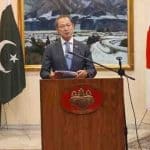ISLAMABAD 01 June (Online): The Human Rights Commission of Pakistan (HRCP) said on Wednesday that the country could not get rid of its multiple crises unless all political stakeholders desisted from any further measures that could imperil the country’s fragile democracy.
In a statement, issued by HRCP Chairperson Hina Jilani, the human rights watchdog noted that the government’s inability or unwillingness to safeguard civilian supremacy or to preserve the dignity of parliament had proven tremendously disappointing.
“The HRCP has closely monitored the ongoing political crisis and notes with great alarm that civilian supremacy has emerged as the greatest casualty,” the statement said.
“At the same time, the political opposition’s history of hostile politics and contempt for the rule of law has played no small part in triggering the wanton destruction of property during 9–10 May,” it added.
“These were not peaceful protests. The evidence points to acts of arson, rioting, looting, vandalism and trespass onto state and private property.”
The statement also said that the judiciary too had been found wanting in its unity and non-partisanship compromised, with serious implications for the trichotomy of powers.
It expressed regrets that the failure of the judiciary to credibly maintain its independence and impartiality had exacerbated the rule-of-law crisis in the country.
Though the allegations of violence and custodial torture against political workers and PTI supporters had yet to be verified, the HRCP stressed that all such allegations merited independent investigation.
Expressing concern over the trial of civilians under the Army Act, the HRCP emphasised that those responsible for the destruction of public and private property must be held accountable and that there was ample provision in the civilian laws for it.
“Any government seriously committed to upholding civilian supremacy would strongly consider repealing Article 2(1)(d) of the Act, which allows civilians to be tried in military courts, thereby denying them their constitutional right to a fair trial.”
The HRCP also objected to the arbitrary manner in which certain cases were selected for trials by the military courts, “thereby violating the principle of equality before the law and equal protection” of the law.
The HRCP stressed the need for all political parties to adhere to the democratic, peaceful and bona fide means to further their political agendas. It said that it saw no benefit to Pakistan’s polity in banning a political party.
“We consider any step by the government to ban the PTI both reckless and disproportionate. In the long term, it would strengthen a bad precedent and prevent political parties from developing naturally in line with the wishes of their electorate.”
The HRCP also opposed any delay in the general elections beyond October 2023. “Such a step by the government would amount to derailing the democratic process and compound the current political instability,” it warns.
“Anything less than free, fair and credible elections in an environment that allows the exercise of all fundamental freedoms, will leave the country open to further ill-judged and undemocratic political ‘experiments’.”
The HRCP expressed deep concerns over the rapid pace at which non-political forces “are wresting the space for which Pakistani civil society has fought long and hard”, adding that democracy “cannot be built on fluid loyalties and shifting narratives”.
“The HRCP opposed what it saw as political engineering in the 2018 elections, but it objects just as strongly to the tactics employed in the attempt to reverse-engineer the democratic process.”
Follow the PNI Facebook page for the latest news and updates.









